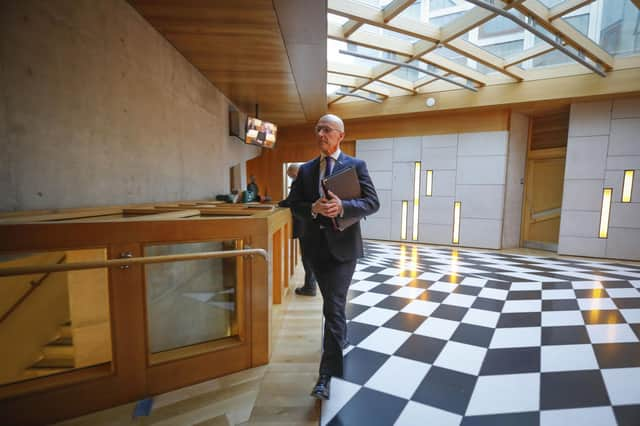How Swinney's Budget is a reminder that Scotland would be far worse off without shared resources of UK – Brian Wilson


Hardly a paragraph of his Budget statement omitted references to the UK Government or what happens in England. Why? Devolution was not meant to initiate a competition but to enable priorities and policies deemed to be in Scotland’s interests. The Scottish Government should be judged by outcomes and nothing else. Mr Swinney has huge resources at his disposal to do things better but that is not what drives his politics. Everything has to be set in a context of boasts and grievance rather than ambition and opportunity.
Modest steps along a “progressive path” are presented as evidence of ethical superiority. The hated factor which goes completely unmentioned is that even these modest measures depend on a UK-wide distribution of funding that Mr Swinney devotes his life to abandoning. Headlines around his budget involved the tax increases imposed upon a few hundred thousand Scots who could scarcely be defined as wealthy. The symbolism of differentiation is powerful and doubtless popular with many who never envisage themselves being caught in that net.
Advertisement
Hide AdAdvertisement
Hide AdThrow in a promise that every additional penny will be spent on the NHS and who can complain? Alas, there are two problems. First we do not, and never will, have a clue how that money is spent as it disappears into the centralised pot. Second, the sum raised is a pittance. The Scottish Fiscal Commission estimates it will bring in £129 million, or 0.3 per cent of the Scottish Government’s revenue budget. Compare that to the £1 billion coming from the latest tranche of Barnet consequentials alone. That’s what will pay for extra NHS spending.
To take another perspective, Mr Swinney quietly announced another £72 million towards completing the CalMac ferries at Port Glasgow. That’s more than half the £129 million gone already. Indeed, the excess cost of these two ferries is double what the caring, sharing Mr Swinney achieved through his income tax increases. Is this the “progressive path” he was talking about?
It is hardly a secret that I want to see a change of UK Government to produce a different set of values and priorities. In that respect, there is no great difference from the 1990s other than that Scotland is, to a significant extent, shielded meantime from the ideology of a Tory government.
That is precisely why devolution came about. If Scotland wants to do things differently in huge areas of policy, that is our entitlement. Whatever the other Tory sins, they have done absolutely nothing to dismantle the formula which gives Scotland an additional £2,300 per head of population to do what we like with.
Over the past 15 years, how much of that advantage has been frittered away through, a, intellectual laziness which generous funding encourages and, b), preoccupation with doing things differently rather than better? And why is it necessary to exaggerate differences in order to forge badges of superiority?
The latter point is demonstrated by Mr Swinney’s repeated claim which also runs through SNP literature (along with the now proven lies about our renewable energy resources) that “people” in England pay prescription charges when over 90 per cent of prescriptions in England are free.
There is a utilitarian argument about whether it costs more to collect the ten per cent than it’s worth. Scotland, Wales and Northern Ireland decided it isn’t. England thinks it’s worth picking up £450 million from the few per cent who pay. That’s no big moral deal and it’s really none of Mr Swinney’s business, so stop misrepresenting it.
Repeating how much he cares about child poverty doesn’t make it go away. Cold statistics prove more than pious words and the SNP’s lip-service to closing attainment gaps, poverty gaps, health gaps and life-expectancy gaps has yielded miserable dividends.
Advertisement
Hide AdAdvertisement
Hide AdThere was nothing in Mr Swinney’s Budget to change any of that. Instead, it should remind us that the challenges Scotland faces would be ten times worse without the fair principle of shared resources across the United Kingdom.
Comments
Want to join the conversation? Please or to comment on this article.
